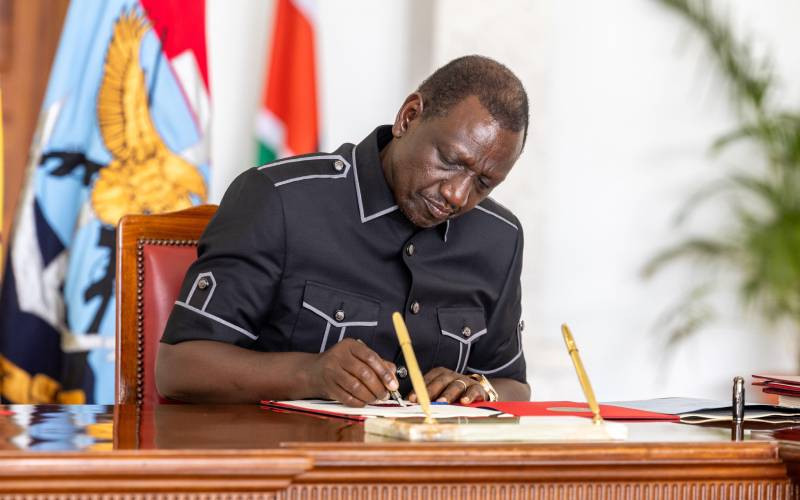Kenya: It is yet to be fine-tuned, but the draft Pesa Mashinani law to be discussed soon by governors has radical proposals likely to pit the county chiefs against Parliament.
The Standard has obtained a copy of the Constitution of Kenya 2010 (Amendment) Bill 2014 that frames the issues governors want Kenyans to vote on in their bid to have allocation of national revenue to the counties increased, end the Members of County Assembly and MPs' alleged tyranny and devolve more services to the grassroots.
Council of Governors (CoG) Chairman Isaac Ruto said the Bill is not final because governors are yet to study the proposals and give their input.
"We are going to have a retreat of all governors to deliberate on the Bill and fine-tune it. We want to ensure all our grievances are captured adequately. Our meeting bringing on board all governors will be held soon. This is just an advance copy by our committee of experts," Ruto said.
Ruto, who is also Bomet governor, affirmed that they are still open to proposals from various stakeholders.
He said the Committee of Experts tasked with framing the issues would give more impetus to their public campaign for the Pesa Mashinani referendum.
Rattle jubilee
County chiefs want allocation to counties not only increased three-fold but the shareable revenue to include grants (non-repayable aid given by foreign governments and other financing institutions) and appropriations-in-aid (revenue spent and then deducted from approved budget by the exchequer).
This move is likely to be fought by the national government considering the previous government opposed the attempt to have grants and appropriations-in-aid pooled with national revenue during the crafting of the sharing formula between the two levels of government.
And to ensure communities enjoy a share of national wealth, the governors want counties to retain 15 per cent of oil, gas and other mineral income in their regions, with five per cent going to local communities, says the draft.
Governors also want the Sh3.4 billion equalisation fund placed under their control, a proposal that opens up a fight with members of the National Assembly who have claimed the kitty.
In addition, the draft Bill proposes to make it harder for the National Assembly to revise allocations passed by the Senate under the Division of Revenue Bill, which determines how the two levels of government share out national revenue.
And on the stalemate with Senate over summonses, the Bill proposes the provision on Senate's oversight over county governments be deleted. Governors have accused senators of summoning them on flimsy grounds yet their respective county assemblies were handling similar audit queries.
To appease Members of County Assemblies (MCAs), governors propose creation of a County Ward Development Fund anchored in the Constitution, but managed by the county government, not MCAs.
The CoG has indicated the Bill would be ready by the end of November.
Stay informed. Subscribe to our newsletter
The latest development is set to rattle the Jubilee administration, given that President Uhuru Kenyatta and his deputy William Ruto have made several attempts to convince county chiefs to abandon their referendum bid.
But governors have insisted that the Government take steps to ensure county cash is increased to meet their demands if a referendum is to be avoided.
The eight issues highlighted in the Bill include proposals to amend Article 203 of the Constitution to triple the share of the latest audited national revenue to counties from 15 to 45 per cent.
If this is approved, counties would get over Sh700 billion, including appropriations-in-aid and grants.
Peter Wanyama, a member of the Committee of Experts that drafted the proposed law, explained that the push to ensure counties get at least 45 per cent of the national revenue is crucial because governors would not be "at the mercy of MPs to approve audited accounts before they get their deserved share".
"Counties' allocations will not be pegged on political mandarins' desire, but on the most recent exchequer accounts," he stated.
There is a strategy to make it difficult for MPs to change the revenue that the Senate has agreed on, with the Bill proposing that support of 90 per cent of the House is required to veto the Senate's position. Currently, two thirds of MPs can alter the allocation.
The governors also want the Division of Revenue Bill identified as a Bill concerning county governments in law. Although there is a Supreme Court ruling to this effect, National Assembly Speaker Justin Muturi has vowed to ignore it.
Also the county governments want to take over the Sh3.4 billion equalisation fund, which is currently being administered by the national government through the National Treasury.
The governors also want three of their colleagues represented in the Commission for Revenue Allocation (CRA), arguing that this would enable them play a role in determining how much funds go to the counties.
In the Bill, governors want the Senate off their backs and are proposing the deletion of Article 225 and 229 (8), which give the Senate the oversight role on county governments. The county bosses have clashed with Parliament over accountability, which resulted in the Senate passing a Motion to starve four counties of funds after their governors failed to honour summons. However, Treasury ignored the resolution.
The county bosses want article 43A amended to enable counties take over the management of national parks, game reserves and water towers within their boundaries and elaborate measures put in place to determine how evictions would take place.
On security, governors want their role captured in law, and are also demanding that a special police unit be established at the county level, to answer to them.They want the County Police Authority to be entrenched in law and not under the National Police Service, as is the case today.
Some of the proposed clauses seek to give counties an equal role in reviewing the national land policy, as the Constitution gives that role to the national government.
Kick out
The governors want the process of their removal from office, presently undertaken by county assemblies and the Senate, to be done after the courts make a ruling on the same.
"Removal of the President, governors and their deputies to be done only after the courts rule that they should be kicked out. Voters should be directly involved in kicking out governors, including preliminary collection of signatures from 25 per cent of all registered voters," reads part of the draft.
The council had set up a technical team to help it craft an appropriate referendum question. The team of six headed by constitutional lawyer Wachira Maina, has finally presented the draft Bill, and according to Wanyama, deliberations are still ongoing.
Wanyama said: "They are also irked by failure of the Interior Cabinet Secretary Joseph ole Lenku to operationalise the county policing authorities they are supposed to chair."
He said if the authorities are anchored in the Constitution, governors would have a say in security matters.
 The Standard Group Plc is a
multi-media organization with investments in media platforms spanning newspaper
print operations, television, radio broadcasting, digital and online services. The
Standard Group is recognized as a leading multi-media house in Kenya with a key
influence in matters of national and international interest.
The Standard Group Plc is a
multi-media organization with investments in media platforms spanning newspaper
print operations, television, radio broadcasting, digital and online services. The
Standard Group is recognized as a leading multi-media house in Kenya with a key
influence in matters of national and international interest.
 The Standard Group Plc is a
multi-media organization with investments in media platforms spanning newspaper
print operations, television, radio broadcasting, digital and online services. The
Standard Group is recognized as a leading multi-media house in Kenya with a key
influence in matters of national and international interest.
The Standard Group Plc is a
multi-media organization with investments in media platforms spanning newspaper
print operations, television, radio broadcasting, digital and online services. The
Standard Group is recognized as a leading multi-media house in Kenya with a key
influence in matters of national and international interest.







